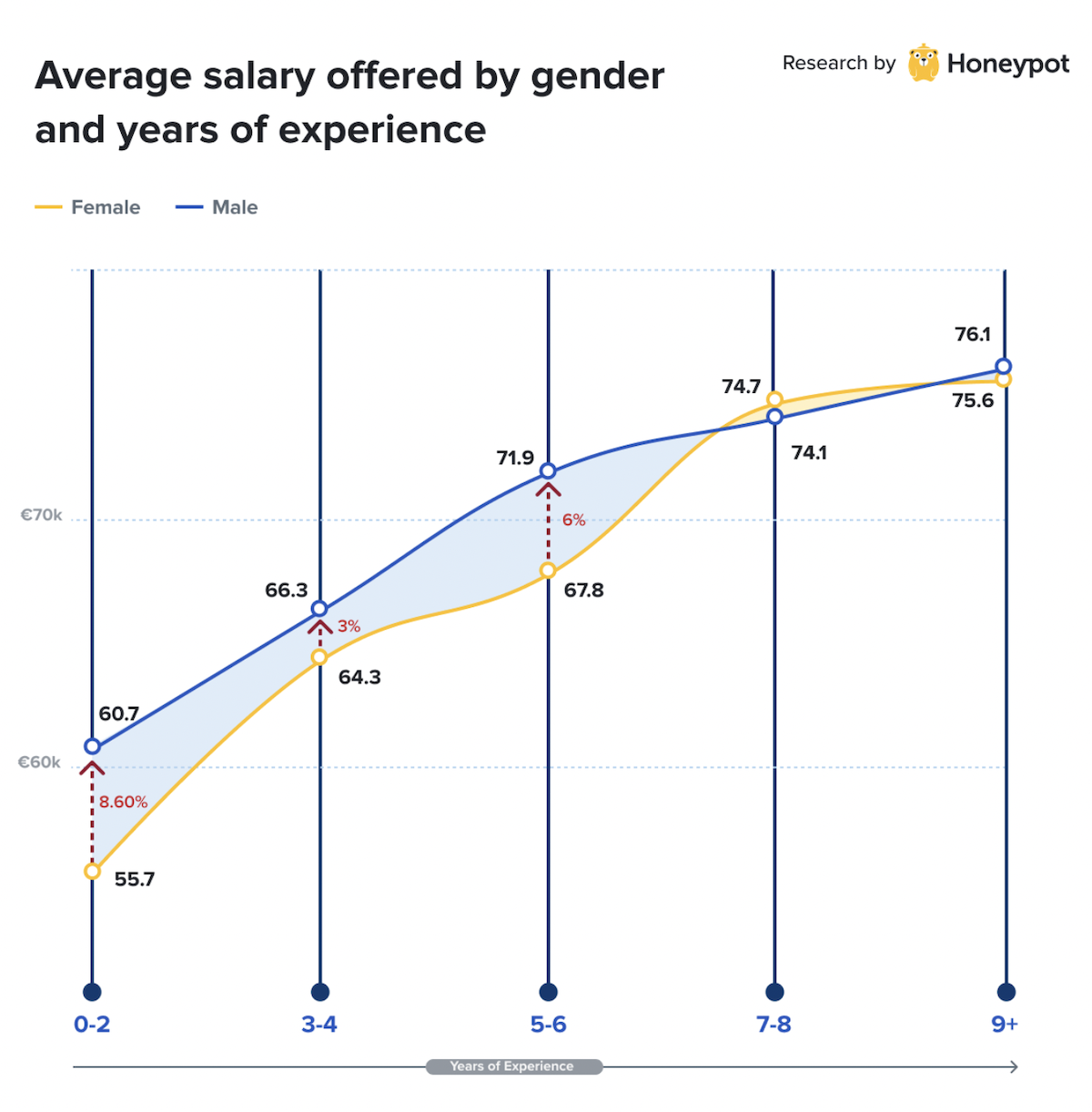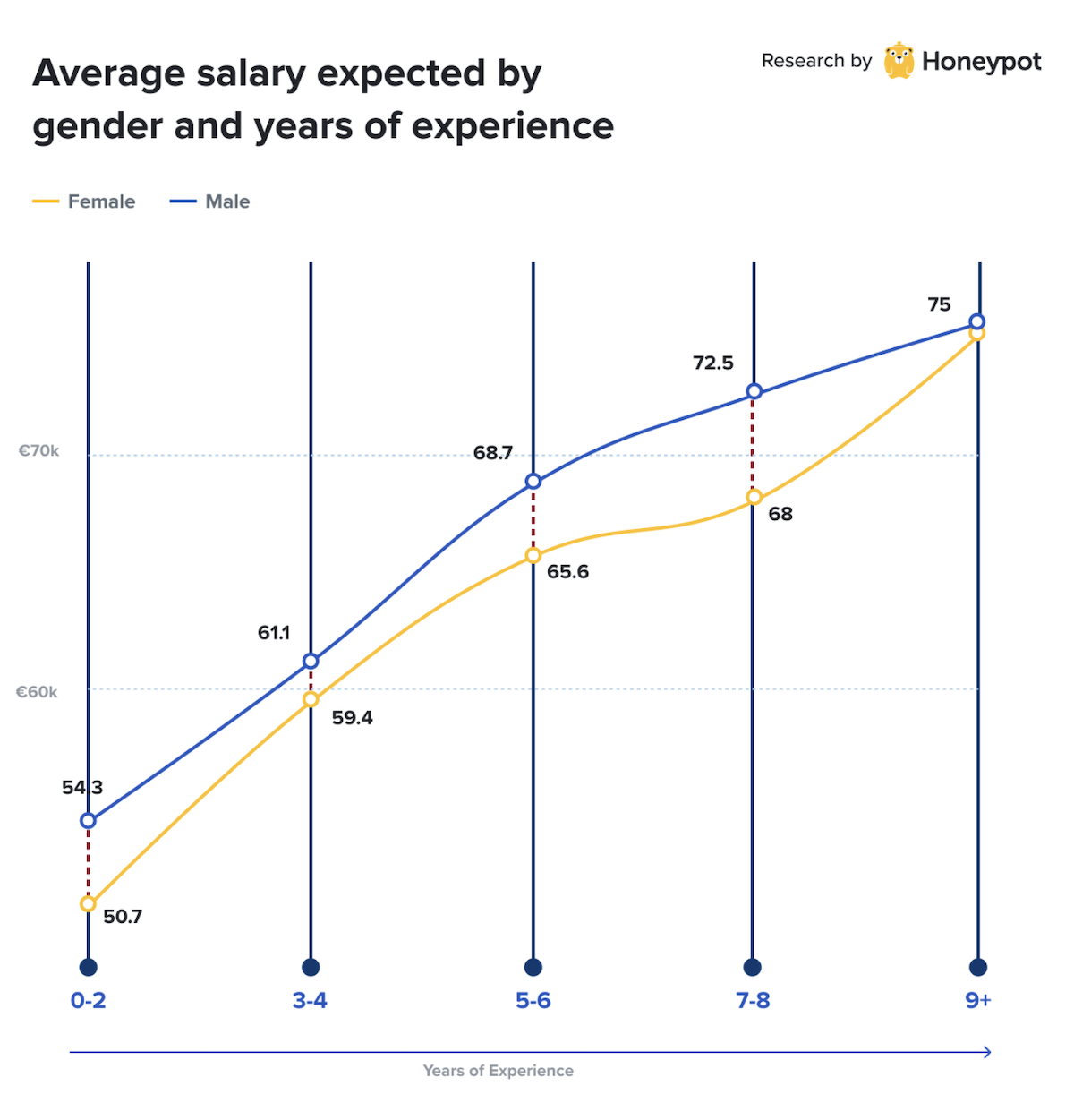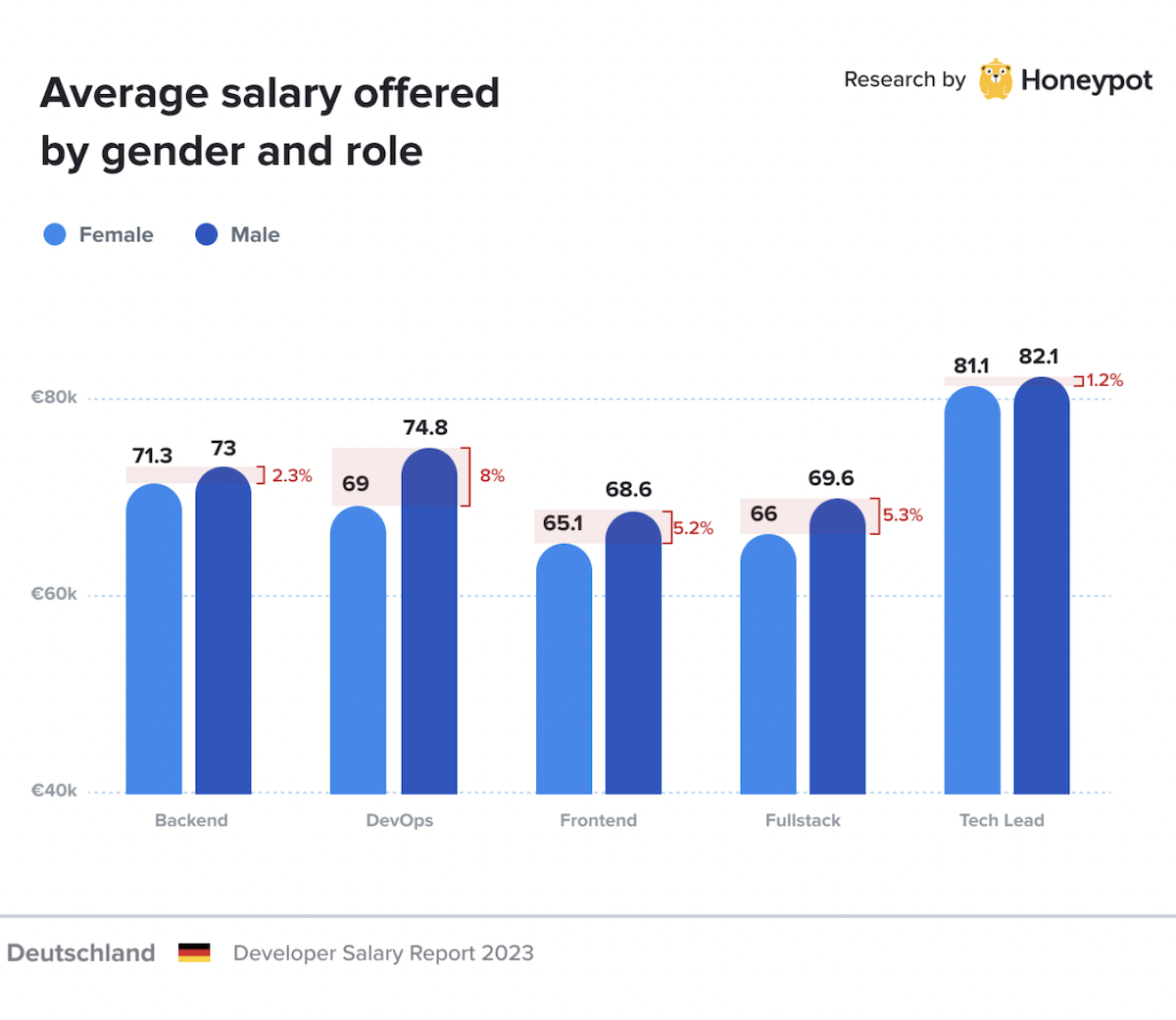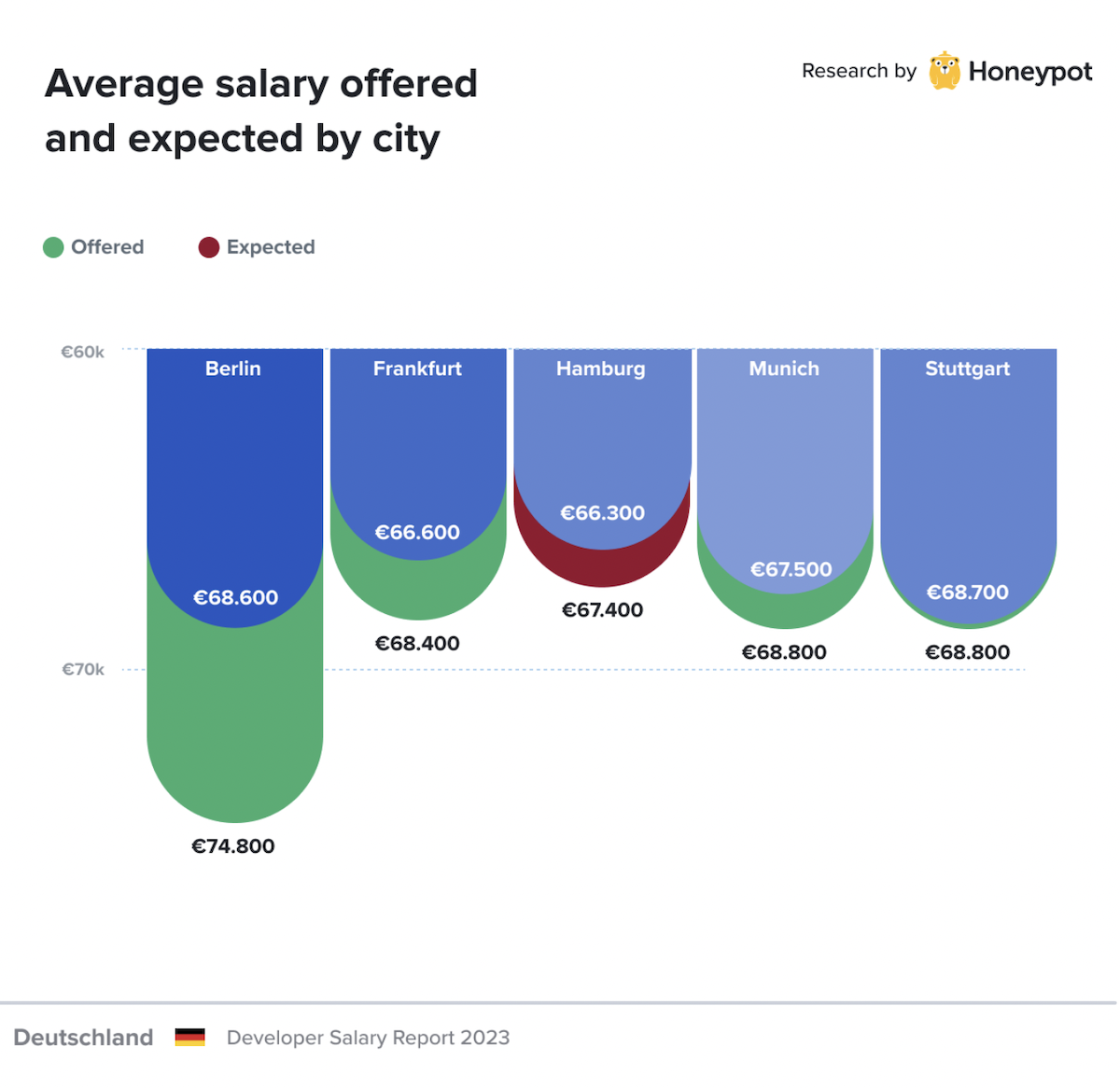New report sheds light on average developer salaries in Germany
5 min read
This article was originally published on .cult by Melina Zacharia and Ines Almeida. .cult is a Berlin-based community platform for developers. We write about all things career-related, make original documentaries, and share heaps of other untold developer stories from around the world.
It’s that time again: the annual Honeypot breakdown of software developer salaries in Germany. We’re building on the data we shared in 2022 and 2021 with new insights from 2023, providing you with the learnings you need to make informed choices around your salary options.
2023 has been a more conservative year of growth but growth persists. Our picture of average salaries over seven years shows the shifts and changes software developer salaries have experienced through pandemics, hiring booms, and threatened recessions.
The past year was predicted to be a tough financial time, and though a European recession may have been avoided, developer salary growth has slowed accordingly. The average offered salary has risen only 1.5% from 2022, compared to a 4.3% rise from 2021 to 2022.
But it’s still more than what many software developers may expect, with a growing gap between expected and offered salaries. In 2023, the 3.8% difference between expected and offered salary is the largest it has been since 2018 (which had a 5.6% difference), suggesting that developers perhaps expected financial difficulties to hit their salaries with more force than actually occurred. It also indicates a clear need for developers to further understand the variables that influence their salaries, to better position them in seeking and negotiating competitive offers.
Salary growth compared to inflation rate in Germany
In 2023 and 2022 Europe’s inflation rates skyrocketed. What does that mean for ‘real’ salary growth?
According to the Federal Statistical Office of Germany, inflation in 2023 is at 8.3%. That means that a mere 1.5% growth in average software developer salaries doesn’t reflect a substantial growth. With inflation rates soaring and a tech crisis underway, the 1.5% increase however does mean that developer jobs continue to be in high demand.
Average developer salaries in Germany
Role, years of experience, gender, and—crucially, in 2023—language ability all affected salary.
In this report, we examine the roles of backend developer, DevOps engineer, frontend developer, fullstack developer, and tech lead.
We specify 0 to 2 years of experience as a junior level, 3 to 6 years of experience as a mid-level, while with 7+ years of experience, you’re considered a senior developer for most companies.

In this chart, green indicates that offered salary surpassed the expected salary, while red indicates that the expectations were higher than the company’s offer.
Key takeaways include:
- DevOps roles showed the highest average offered salary for junior developers: a 9.3% growth
- Backend roles saw the highest salary growth with years of experience: 13.2% growth from 1-2 years to 3-4 years
- Frontend roles saw an 11.2% growth
As we’ve found in previous years, expected salaries tend to be consistently lower than offered salaries.
It’s interesting to observe that developers in more senior roles (4+) years have a better understanding of the market’s salary benchmarks. While junior and entry-level developers consistently expect less.
Most interview invites in Germany by role
Based on the number of interview invites extended for each role, backend developers were most in demand on the Honeypot platform, followed by fullstack developers, frontend developers, and DevOps engineers. More specifically:
- Backend developer 35%
- Fullstack developer 31%
- Frontend developer 24.7%
- DevOps engineer 7.4%
The gender pay gap has grown… again
For the second year in a row, the gender pay gap between male and female developers has widened. In 2023, this was particularly notable in junior roles, where men were paid up to 8.6% more than women.
From 2021 to 2022, the average offered salary was €69,600 for men and €66,500 for women: a difference of 4.6%. From 2022 to 2023 the average offered salary is €71,100 for men and €67,800 for women: bringing the pay gap to 4.75%.
This indicates the continuation of a worrying trend for female developers, who continue to expect much less pay and be paid much less than their male counterparts. This is especially true for women in junior roles, where women are offered up to 8.6% less money.


Women’s expectations are consistently lower than their male counterparts across all experience levels.
The negative trend continues even when we look at the average offered salaries based on role and gender. Men receive higher paychecks across all most-in-demand developer roles in Germany. For DevOps engineers especially, an increasingly popular role, the gender pay gap reaches 8%.

Salary by language & location
We intensified our research into language ability and its impact on average developer salary this year, considering an increased number of categories for language profiles, as well as the number of interview invites talent would receive depending upon their location and language ability.
Most roles showed little or no difference for German and non-German speakers, particularly backend developers, suggesting that when developer demand is high enough, language is less important.

In terms of years of experience, the more junior the developer, the more likely that local language skills will lead to a higher salary, sometimes by as much as 8.9% higher than those who are not local-language speaking.
When it comes to demand based on interview invites. Our data showed that German speakers receive eight times more interview invites than jobseekers who don’t speak the local language.
Interestingly, our data on expected salary showed that expected salary was not notably higher for German speakers.

Salary by city
Once again, Berlin came first amongst German cities in terms of average offered salary. While in 2022 it offered a slightly lower salary than Munich (though still equated to more income, given relative costs of living), in 2023 it also has significantly higher salaries than other German cities. Developers in Berlin are offered 9% more than developers in the rest of Germany.
However, developers in Berlin are not demanding much more than their counterparts in the rest of Germany. On average, Berlin companies offer 8.6% more than what developers ask, indicating issues in the supply and demand balance of developer roles in Berlin. It could mean that Berlin has a high demand with fewer developers than the rest of Germany or that developers are leaving the German capital.

Average developer salary in DACH
Zooming out to the wider DACH region offers insight into how individual locales are contending with developer supply and demand as well as their own cost of living situations. Considering company size also gives employers a useful sense of how to compete for quality talent.
Perhaps unsurprisingly given the cost of living, Switzerland offers the highest average salaries within the DACH region. Germany tends to follow in second place for most roles and company sizes, though the Netherlands pays tech leads notably higher salaries: 6% more than Germany.

Most in-demand tech stacks in Germany
Companies in Germany are mostly looking for software developers proficient in Javascript, React, Docker, Typescript, and Python.

Methodology
Our 2023 data is an average of 2022 and 2023 data (28.5k data points) to ensure accuracy given the year is not yet over. Expected salary data is determined from developer profiles on the Honeypot platform. Offered salary data is based on a company’s initial offer during the interview process, gathered on the Honeypot platform. It does not reflect the final negotiated and contracted amount. We use an external library to determine gender based on the individual’s first name.
You can download the full 2023 Developer Salary Report here.


